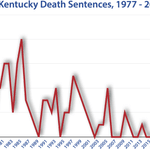
State & Federal
Kentucky

Timeline
1868 — Susan Eliza is the last child to be hanged in Kentucky at thirteen years old. She was the last female executed by Kentucky.
1928 — Kentucky sequentially executes seven men by electrocution.
1936 — Rainey Bethea is executed by hanging in the last public execution in Kentucky, with newspapers at the time estimating as many as 20,000 witnesses.
1938 — Kentucky abolishes hangings after Rainey Bethea’s public execution.
1974 — Kentucky enacts a new capital sentencing statute calling for a mandatory death sentence for those convicted of murder.
1976 — The Kentucky legislature repeals the mandatory death penalty statute. The Commonwealth’s current death penalty statute goes into effect.
1989 — In Stanford v. Kentucky, the U.S. Supreme Court holds that the imposition of capital punishment on an individual for a crime committed at 16 or 17 years old does not violate the 8th amendment as cruel and unusual punishment.
1998 — Kentucky adopts the Racial Justice Act, allowing judges to consider whether racial bias played a role in the decision to seek or impose the death penalty.
2002 — Larry Osborne, the youngest man on Kentucky’s death row, is acquitted of a crime for which he was wrongfully convicted at 17 years old.
2008 — In Baze v. Rees, the U.S. Supreme Court holds that Kentucky’s four-drug lethal injection process does not violate the 8th amendment.
2011 — Kentucky turns over their supply of sodium thiopental, a drug used in lethal injections, to the DEA after Georgia’s supply was seized based on the questionable legality of how it was imported. Kentucky obtained its supply from CorrectHealth, a private Georgia correctional health company.
2014 — Kentucky drops its proposed use of a two-drug execution method, including midazolam and hydromorphone, after Ohio and Arizona’s use of midazolam in a two-drug protocol resulted in two prolonged executions where the inmates where reportedly gasping after being injected.
2018 — The Kentucky Supreme Court strikes down the Commonwealth’s death penalty intellectual disability law which requires proof of an IQ score of 70 for a capital defendant to be found ineligible for the death penalty. The court found that a fixed 70-IQ cutoff score is incompatible with the diagnostic framework of the medical community.
2019 — Eugene “Red” Mitchell is acquitted of capital murder and related charges after spending nearly six years in jail due to his inability to afford bail.
2019 — Before leaving office, Governor Matt Bevin commutes the sentences of Gregory Wilson and Leif Halvorsen, two of the state’s longest serving death row prisoners, to life without parole.
2022 — Kentucky becomes the second state in the U.S. to bar imposing the death penalty on defendants diagnosed as severely mentally ill.
Famous Cases
Rainey Bethea, executed August 14, 1936 at Owensboro, Kentucky, was the state’s last public execution. He was publicly hanged for rape on August 14, 1936 in a parking lot in Owensboro, Kentucky (to avoid damage to the courthouse lawn by thousands of people who were expected to attend). Bethea, who was black, confessed to the rape and murder of a 70-year-old white woman named Lischia Edwards but he was never charged with murder. Murder was punishable by death in the electric chair at Eddyville while rape was punishable by public hanging in the county where the rape occurred. Prosecutors opted to go with the rape charge only. The spectacle that attended the hanging contributed to the end of public executions in the United States.
Kevin Stanford is one of three juvenile offenders sentenced to death in Kentucky since the Commonwealth brought back capital punishment in 1975. Sentenced to death for a January 1981 murder committed when he was 17 years old, Stanford’s case went to the U.S. Supreme Court, which — in a 5 – 4 vote — upheld the use of the death penalty against offenders aged 16 or 17. In 2003, Governor Paul Patton commuted Stanford’s death sentence to life without possibility of parole. The U.S. Supreme Court overturned Stanford v. Kentucky in 2005, ruling in Roper v. Simmons that the application of the death penalty against offenders younger than age 18 constituted cruel and unusual punishment. The Kentucky Supreme Court had previously overturned the conviction of Todd Ice, who was 15 years old when he charged with the December 1978 murder of a seven-year-old girl. On retrial, Ice was convicted of a lesser offense.
Notable Exonerations
Larry Osborne — then the youngest person on Kentucky’s death row — was acquitted upon retrial in July 2002 for the December 1997 murders of two people. Osborne was 17 at the time of his arrest. The 1998 conviction and death sentence was overturned by a unanimous vote of the Kentucky Supreme Court and a new trial was ordered.
Milestones in Abolition/Reinstatement
In 1880, Kentucky abolished public hanging. In 1920, Kentucky restored public hanging for rape and provided that the sentence was to be carried out in the county where the rape occurred, although prisoners condemned for murder were executed in prison in the electric chair.
In 1938, Kentucky abolished hanging after as many as 20,000 people witnessed the August 14, 1936 hanging of Rainey Bethea (see above).
In 1974, two years after Furman v. Georgia, Kentucky enacted a new capital sentencing statute, Ky. Rev. Stat. § 532.030(1) (1974), that went into effect January 1, 1975. The statute called for a mandatory death sentence for those convicted of murder. The three prisoners sentenced to death under that statute had their death sentences overturned when the U.S. Supreme Court declared mandatory death sentences unconstitutional on July 2, 1976.
In a special legislative session in December 1976, the Kentucky legislature repealed the mandatory death penalty statute and enacted the Commonwealth’s current death penalty statute, which took effect on December 22, 1976.
Kentucky “Firsts”
Kentucky adopted the Racial Justice Act on February 5, 1998, allowing judges to consider whether racial bias played a role in the decision to seek or impose the death penalty.
Other Interesting Facts
Kentucky holds the record for the most judicially authorized executions in a single day: on July 13, 1928 seven men were sequentially electrocuted in “Old Sparky” (the nickname given to the electric chair in Eddyville).
Kentucky has not executed a female in more than 150 years. On February 7, 1868, Kentucky executed a 13-year-old black girl, identified only as “Susan.” The youngest person (whose age is known) executed in the state was an enslaved 12-year-old boy named Bill who was hanged on July 30, 1791.

Resources
- Kentucky Coalition to Abolish the Death Penalty
- American Bar Association Kentucky Death Penalty Assessment
- Department of Corrections
- Prosecutors Advisory Council
- Department of Public Advocacy
- Victims’ services
- See Roberta M. Harding, Kentucky: Life and Death in Kentucky: Past, Present, and Future, Kentucky Law Journal On-Line, vol. 102 (2013 – 2014).

Kentucky Execution Totals Since 1976
News & Developments
News
Aug 28, 2025
Kentucky Governor Cites Constitutional Concerns with Execution Protocol and Drug Acquisition Issues in Refusal to Set Execution Date
This week we are featuring some articles from the first part of 2025 that we think are worth another look. We’ll be back with new articles next week. This article originally ran on February 11, 2025. In June 2025, Kentucky Attorney General Russell Coleman requested that Governor Andy Beshear set an execution date for death row prisoner Ralph Baze. In a late June 2025 reply, Gov. Beshear declined to do so because of an April 2025 Franklin County Circuit Court ruling that…
Read MoreNews
Jul 15, 2025
Kentucky Governor Cites Constitutional Concerns with Execution Protocol and Drug Acquisition Issues in Refusal to Set Execution Date
In June 2025, Kentucky Attorney General Russell Coleman requested that Governor Andy Beshear set an execution date for death row prisoner Ralph Baze. In a late June 2025 reply, Gov. Beshear declined to do so because of an April 2025 Franklin County Circuit Court ruling that found part of Kentucky’s execution protocol unconstitutional. Gov. Beshear indicated that several steps must be taken by the Department of Corrections (DOC) to address the issues raised by the court…
Read MoreNews
Jun 04, 2025
2025 Roundup of Death Penalty Related Legislation
More than one hundred bills have been introduced this year in 34 states and in Congress to expand and limit use of the death penalty, abolish and reinstate the death penalty, modify execution protocols and secret the information about them, and alter aspects of capital trials. Thus far, nine bills in five states have been enacted, with Florida enacting the most legislation. Of the bills that have been signed into law, three modify execution protocols; two expand…
Read MoreNews
Oct 31, 2024
Kentucky Supreme Court Denies Attorney General’s Request to Remove Injunction on Executions
Kentucky…
Read MoreNews
Jul 09, 2024
Disability Pride Month Series: Serious Mental Illness Exemptions and Legislation
Disability…
Read More


